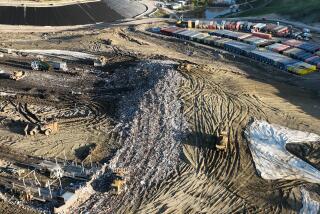Company to Seek to Overturn Order on Covering Coal at Port
- Share via
In a sharp retort to local air quality officials, operators of a major coal terminal in the Port of Los Angeles said Friday that they will use all legal means to reverse a decision requiring the terminal to build domes over piles of potentially harmful petroleum coke.
The attack on the South Coast Air Quality Management District came one day after the agency’s staff rejected a formal request by the Los Angeles Export Terminal to halt construction of the two covers.
“We feel this is a real miscarriage,” said Gerald Swan, the export terminal’s chief executive officer. “To me, everything I have seen in the last 30 days is politically motivated. It has nothing to do with science, and it is simply unfair.”
By the end of next week, Swan said, the terminal will appeal Thursday’s ruling by the air panel to a five-member board that reviews agency decisions. Depending on the outcome of those hearings, export terminal officials may consider a lawsuit.
Air panel officials defended the agency’s decision, saying that there is no evidence that the terminal can meet air pollution standards without the enclosures. They said the terminal’s own air pollution tests suggest that the facility might be exceeding limits for petroleum coke.
“Our decisions are made on good scientific reasons. Politics does not enter into it,” said Tom Eichhorn, the air panel’s communications director. “The rules require that they use the best available technology. We just don’t think they can meet the standards without the domes.”
The decision to fight the ruling heightens a controversy that began in early July, when terminal operators requested suspension of a agreement reached in December that called for them to build the domes.
The export terminal had opted to construct the roofs as a condition for securing an air panel permit to store and export petroleum coke, a byproduct of the refining process that can be used as a fuel for heating or industrial purposes.
Residents and workers in the harbor area, who worked to get the enclosures built, have been worried about the health effects of exposure to petroleum coke dust. Fine particles of the material can aggravate respiratory illnesses such as asthma, bronchitis and pneumonia.
In an eight-page statement issued Friday afternoon, export terminal officials detailed their reasons why the domes should not be built.
The AQMD ruling, they said, is inconsistent with other recent decisions allowing the export terminal’s competitors to store almost 500,000 tons of petroleum coke outdoors with pollution controls that are inferior to the terminal’s.
According to the statement, the export terminal has a state-of-the art watering system to control dust. In addition, 15 tests paid for by the terminal have shown that the facility meets air quality standards.
If the export terminal is not allowed to handle petroleum coke, officials said, it will be stored at other coal facilities in the area with less effective pollution controls.
In addition, terminal officials contend that the cost of building the domes has risen from $14 million to more that $18 million. As a result, it would cost more than $3 million per ton of reduced emissions. Air quality regulations, they said, specify that the cost of the best available technology should not exceed $12,000 a ton.
The air panel’s decision “is inconsistent with all available scientific evidence,” the statement said. “The decision regarding [the export terminal] was discriminatory and an absolute abuse of AQMD’s permitting responsibilities.”
AQMD officials disputed the charges that the export terminal is being unfairly singled out for tougher enforcement than other facilities. Some of the older terminals, they said, have roofs or received permits when the regulations were not as stringent.
More to Read
Sign up for Essential California
The most important California stories and recommendations in your inbox every morning.
You may occasionally receive promotional content from the Los Angeles Times.














